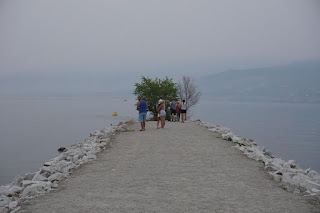A century of grieving for California
Here are contents of an email to reporter Erica Hellerstein, who did a piece in Coda Story with the title "Grieving California".
Thank you for saying what Joan Didion isn't here to say. I'm sorry,
but I skimmed your piece on grieving California. Twice. I just could
not look too closely at the degree of personal loss it contained, the
loss that so many of us share.
I became fascinated by the geography of California when our daughter's
husband moved to Mountain View to work for "a company that sells
advertising". Every year for five years we drove down from Vancouver
BC to visit them. I found a bicycle and used to go riding on the Bay
Trail between Alivio and Palo Alto. I read about the history of the
Bay Area, then I read David Carle's "Water and the California Dream"
and the place took on a whole different dimension. And, of course, I
found Joan Didion's California essays.
We had one last trip planned, one last chance for me to see the sunset
light on the hills of the East Bay. And then things went into lockdown
and our daughter and her husband and their toddler daughter moved to
Ontario in the first crazy wave of the pandemic.
But my minor regret about California is trivial when we look at the
big picture. Over five decades ago I stood on a hillside at Habitat
Forum, a conference on how we were going to feed and house the five
billion people on the planet. I met Jay Baldwin, probably up from
Sausalito, and he summarized the problem from his point of view, "We
have to learn to live within the carrying capacity of our regions."
So nothing in your essay - except the loss of your best friend - is
surprising. I've spent decades watching the process of intensification
and growth and sprawl and waste and greed destroy the agricultural
valley in BC where I grew up. And watched the news as BC luxury homes
overlooking exclusive vineyards burned, just like California. It's
been hard. And it must be a hundred times harder for the native people
who once lived directly from the land before churches and railways and
irrigation and real estate swept them aside.
In 1913, William Mulholland attended the dedication of the Los Angeles
Aqueduct, a sign of the growth that was transforming the state. In
1914 John Muir died. He foresaw the ecological side of what is
happening now. Ishi, a survivor of the genocide of his Yahi people,
died in 1916. So the concern that psychologists see in kids today is
not new, but it has been professionalized and mainstreamed. Now there
is a jargon term for what my wife and I felt seven decades ago when we
understood how growth and development and overconsumption would
inevitably play out.
I'm 90% sure you know all this, and way, way more. And I'm 75% sure
that you held back on detailing the steps forward that we have to
take. Instead, you simply repeated the least confrontational
narrative: that governments have failed to act. I think this was a
good choice. People need to feel in themselves the loss that your
piece reveals without pivoting away.
But what's next? I'd have to take my shoes off to count the things
that California (and the rest of us) need to work on. But the Big Two
that Julia Whitty identifies are overpopulation and overconsumption.
Whitty, like yourself, stops short rather than distract her readers
from the core insights. I have to admit that maybe there is only a
small audience who are ready to hear that fire season is driven, when
you unpeel the layers of causality, by gender and social inequality
that is maintained and promoted by the Unholy Trinity of Big Business,
Big Religion, and Big Crime.
Or maybe you see things differently. Or maybe you are working things
through. You wouldn't be alone. Didion is gone so you can't have a
chat with her about changing perspectives, but maybe you know somebody
who knows Kim Stanley Robinson and you could have a little two-person
workshop. His fourth book in the Mars trilogy has a couple of pieces
that echo the "still here" nostaglia, solastalgia if you will, of a
terraformed Mars that is refreezing. And his "Aurora" is arguably the
last science fiction novel, a reconsideration of the genre that he
mastered. And his "Ministry of the Future" releases the anger held
back in his Washington Trilogy and his New York 2041. Really. See if
he wants to talk. You're from Berkeley, just down the road from his
co-op in Davis, but more important, you are emotional neighbors.
Best of luck,
Hugh Tayler
header photo: valley full of smoke august 2017




Comments
Post a Comment